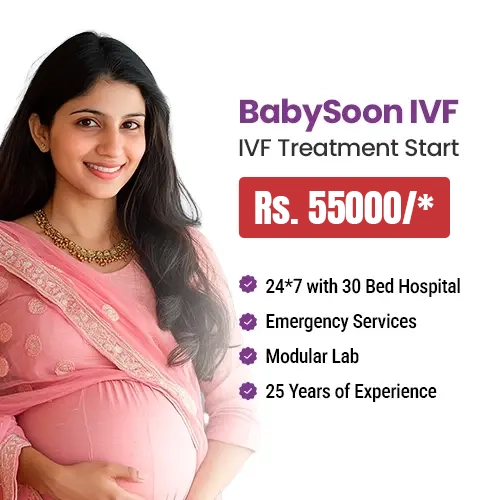

We at BabySoon consider that hope is one of the inevitable parts of our lives that brings positive energy to our souls. There are instances when women are unable to conceive despite using IVF techniques and still failing to achieve the desired results.
Recurrent Implantation Failure is commonly known as the failure of more than three high-quality embryos; however, the multiple failures of embryo transfer retain unfortunate consequences. Although, at BabySoon, we own the latest technology and methods, we are also the best service provider for recurrent implant failure in Delhi.
1) Pre-Art Therapy:- Hemoglobin, calcium, vitamin D, and other blood tests will be used to assess the patient's overall health. Folic acid, zinc, selenium, and other supplements are also given to enhance the patient's health and the quality of the eggs and sperm.
DHEA, L-arginine, and wheatgrass are recommended for those who have a poor ovarian response since they enhance the quality of the egg and sperm.
Insulin-sensitizing medications like metformin and myo-inositol are prescribed to PCOS patients. For obese PCOS patients, maintaining a healthy weight and eating a balanced diet are essential.
2) Personalized protocol:- BabySoon is entitled as the best Failed IVF Cycle Treatment Clinic in India and the approach is chosen after carefully examining each couple's history, investigations, and hormone profile.
3) Sperm Selection through ICSI techniques:- We consider making result-oriented outcomes Moreover, our highly experienced embryologist selects high-quality sperm through ICSI methods. Although we utilize all the latest techniques to enhance our productivity over time.
4) Hysteroscopy:- In the simplest term, the hysteroscopy method is performed when the clients went through implantation failure. This is one of the effective methods to increase the outcomes as it helps to bring a vivid picture of uterine abnormalities. Usually, in ultrasound technology, there are consequences that it doesn’t show the exact picture of problems. However, this method helps in critical examination and enhances the chances of pregnancy.
5) Doppler Flow:- In this method, we inject drugs such as sildenafil and GCSF to improve the proper blood supply in the endometrial lining.
6) Uterine relaxants:- To improve implantation results this treatment is given one hour or 6 hours earlier for better functioning of the embryo in the endometrial lining.
7) Laser Hatching:- This treatment is performed on the same day as embryo transfer to improve the results of implantation. It is often recommended for embryos with thick shells, frozen embryos, or clients with advanced maternal ages.
8) Preimplantation genetic diagnosis (PGD)/PGS:- This treatment helps to examine the abnormal embryos and also supports improving the positive rates of pregnancy.
9) Day of Transfer:- With the glorifying experience of 15 years, Dr. Jyoti Bali performs result-oriented embryo transfers. There are cases when sequential transfers are suggested when the embryos are accessible or Day 5/ Day 3 embryo transfers are done. Furthermore, the day 3 embryo is followed by Day 5 embryo.
Intrauterine Insemination (IUI) is a basic fertility technique in which processed (concentrated and washed) sperms are implanted into a woman’s uterus during ovulation to boost her chances of becoming pregnant.
Fertilization (meeting of egg and sperm) occurs in the body during IUI (fallopian tubes). IVF, on the other hand, is carried out in a laboratory.
The success rate of IUI is approximately 20%.
Stimulated IVF- A woman takes medicines/injections for 9 to 12 days to stimulate both of her ovaries to generate and mature multiple egg follicles. During the stimulation phase, a physician will do ultrasounds to track the follicles growth until they reach a specified size (18-22mm). Natural IVF- In this cycle, instead of stimulating your ovaries to produce multiple eggs, the Natural Cycle IVF Process is meant to select that one egg that your body produces naturally.
Multiple pregnancy risk is reduced. Reduces the high costs associated with stimulation medicines. Reduces the risk of drug-related adverse effects.
Controlled ovarian hyper stimulation is a procedure in which the patient’s ovaries are stimulated for 10-12 days with hormone injections (gonadotrophins) in order to obtain the highest number of mature oocytes (eggs).The response to these injections is tracked by ultrasound, and after the cohort of follicles reaches 18-22mm (minimum 4-5), a trigger injection is administered, followed by ovum pickup (egg collection) 34-36 hours later.
Ovaries of some females might respond excessively to the fertility drugs. OHSS(Ovarian Hyperstimulation Syndrome) occurs in a minority of females who overrespond, symptoms of which include, vomiting, nausea, severe discomfort, abdominal distension and dehydration. Note: The patient should immediately notify the clinician in case of such symptoms
A couple is considered to be infertile when they fail to conceive after one year of unprotected sexual intercourse.
No, babies born out of IVF do not have any genetic abnormalities.